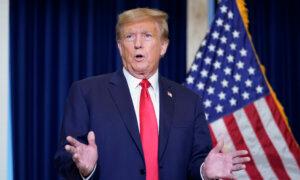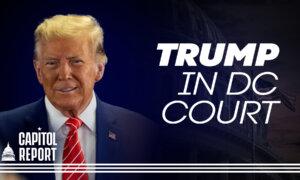The judges ruled that immunity that protects a president no longer apply to ‘citizen Trump.’ The case will likely be appealed to the Supreme Court.
The U.S. Court of Appeals for the DC Circuit ruled on Feb. 6 that former President Donald Trump was not immune to prosecution for conduct that the Justice Department (DOJ) included in its indictment related to the events of Jan. 6, 2021.
“We have balanced former President Trump’s asserted interests in executive immunity against the vital public interests that favor allowing this prosecution to proceed,” the decision reads.
“We conclude that ‘[c]oncerns of public policy, especially as illuminated by our history and the structure of our government’ compel the rejection of his claim of immunity in this case,” the judges added, citing precedents.
The appeal was heard by Judges Karen Henderson, Michelle Childs, and Florence Pan. The decision was unanimous.
Notably, the judges seemed to sidestep interpreting presidential immunity as it pertains to criminal prosecutions.
“For the purpose of this criminal case, former President Trump has become citizen Trump, with all of the defenses of any other criminal defendant,” the judges wrote. “But any executive immunity that may have protected him while he served as President no longer protects him against this prosecution.”
The ruling will likely be appealed by President Trump’s attorneys, who decried the Biden administration’s prosecution as encouraging cycles of recrimination for future presidents. The Supreme Court previously declined Special Counsel Jack Smith’s request to fast-track the case, but it could end up there regardless.
This particular appeal stalled President Trump’s DC trial, which had a tentative start date of March 4 but was removed from the court’s calendar by Feb. 2.
President Trump has repeatedly warned that ruling against him would have dire implications for the office.
“If immunity is not granted to a president, every president that leaves office will be immediately indicted by the opposing party,” he wrote in all capital letters in one of his many TruthSocial posts on the topic. “Without complete immunity, a president of the United States would not be able to properly function!”
During oral argument on Jan. 9, DOJ attorney James Pearce predicted that favoring President Trump’s interpretation of presidential immunity would allow “frightening” prospects. He cited Judge Florence Pan’s hypothetical of a president avoiding prosecution for using SEAL Team Six to assassinate one of his political opponents.
The appeal underscores the unprecedented nature of DOJ’s prosecution and the relatively vague contours of presidential immunity, which was outlined in Supreme Court cases involving former President Richard Nixon.
President Trump’s attorney John Sauer urged the judges to focus on underlying constitutional provisions involved with presidential immunity. Mr. Sauer argued, among other things, that the impeachment judgment clause of the U.S. Constitution indicates that Congress held responsibility for trying a president. Criminal prosecution, he said, could only occur after Congress had impeached and convicted a president.
The House of Representatives notably impeached former President Trump for inciting an “insurrection” on Jan. 6, but the U.S. Senate ultimately fell short of the 60 votes needed to convict him.
President Trump could either appeal directly to the Supreme Court or ask the entire appellate court to reconsider the case in what’s known as an en banc hearing. His attorneys requested that type of hearing for a ruling on the gag order that District Judge Tanya Chutkan issued in October, but it was denied.
The judges also addressed concerns about their jurisdiction to rule on the issue. An amicus brief from American Oversight had argued that it shouldn’t be able to hear the appeal.
Decisions by the Supreme Court can be relatively narrow, but it’s possible they could, at some point, issue a ruling weighing in on the legality of President Trump’s conduct on Jan. 6.
Combined, the cases against President Trump have complicated what’s expected to be an intense campaign season. President Trump will be running against Republican contenders to effectively have a rematch against President Joe Biden, whose administration is currently prosecuting him, in part, over the response to their previous contest.
After the Jan. 9 hearing, President Trump suggested that President Joe Biden was attempting to use the prosecution to boost his prospects for the 2024 election. For his part, President Biden posted on X that one “can’t be pro-insurrectionist and pro-American.”
Another post on Jan. 10 read: “Trump exhausted every legal avenue available to him to overturn the election, but the legal path just took him back to the truth: that I won the election—and he lost.”
Original News Source Link – Epoch Times
Running For Office? Conservative Campaign Consulting – Election Day Strategies!


